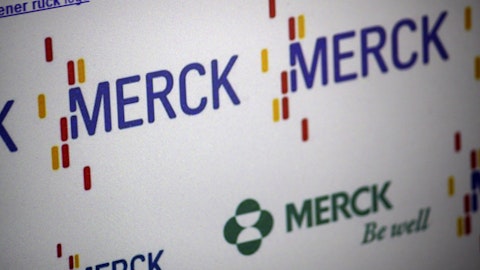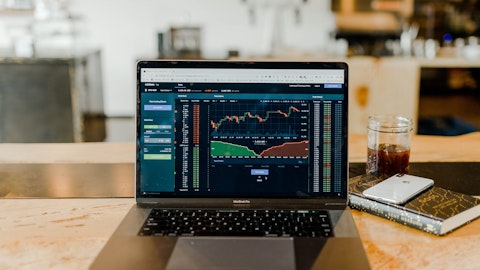In this article, we’ll analyze 5 healthcare stocks to watch amid Senate’s healthcare bill. To read our detailed analysis of these stocks and how they will be impacted by the new laws, go directly to see the 10 Healthcare Stocks to Watch Amid Senate’s Healthcare Bill.
5. Bristol-Myers Squibb Company (NYSE:BMY)
Number of Hedge Fund Holders: 70
Bristol-Myers Squibb Company (NYSE:BMY) is a pharmaceutical company working to develop, license, and market biopharmaceutical products across the globe. Its products cater to hematology, oncology, cardiovascular, and several other diseases and conditions. Chris Schott at JPMorgan holds an ‘Overweight’ rating on Bristol-Myers Squibb Company (NYSE:BMY) shares as of this August, alongside an $85 price target.
The Senate’s recent healthcare bill is expected to cause many companies to lose patent exclusivity for their drugs by 2026 at the earliest. Bristol-Myers Squibb Company’s (NYSE:BMY) Eliquis is among those drugs. By May, Eliquis had driven up sales for the company by 37% to $2.6 billion. The impact of the act on this product could significantly harm Bristol-Myers Squibb Company (NYSE:BMY).
Bristol-Myers Squibb Company (NYSE:BMY) was owned by 70 hedge funds in the first quarter of 2022. Their total holdings were valued at $2.4 billion.
Carillon Tower Advisers, an investment management firm, mentioned Bristol-Myers Squibb Company (NYSE:BMY) in its first quarter 2022 investor letter. Here’s what the firm said:
“Stock selection contributed the most while sector allocation was also positive. An underweight to communication services and an overweight to energy helped performance, while an underweight to consumer staples and an overweight to materials detracted. Stock selection was strong within healthcare and materials but was weak within information technology and industrials. Bristol-Myers Squibb (NYSE:BMY), the biopharmaceutical company, entered into accelerated share repurchase agreements.”
4. AbbVie Inc. (NYSE:ABBV)
Number of Hedge Fund Holders: 76
AbbVie Inc. (NYSE:ABBV) is a biotech company operating globally. It offers products like HUMIRA, which treats various autoimmune disorders as well as other conditions like intestinal Behçet’s disease. The company is based in North Chicago, Illinois. JPMorgan’s Chris Schott holds an ‘Overweight’ rating and $180 price target on AbbVie Inc. (NYSE:ABBV) shares as of this August.
Several of AbbVie Inc.’s (NYSE:ABBV) products may be negatively impacted by the Senate’s recent healthcare bill. The blood-cancer pill Imbruvica, arthritis and atopic dermatitis pill Rinvoq, and leukemia treatment Venclexta are some of the major products facing negotiated prices before the lapse of their patents. Imbruvica brought in $5.4 billion in sales for AbbVie Inc. (NYSE:ABBV) in 2021, while Rinvoq is expected to bring in $7.5 billion in sales by 2025, according to SVB Securities analyst David Risinger. Venclexta as well brought in $1.8 billion in 2021 sales. These products may end up facing negotiated prices by 2026, 2028, and 2026 again, respectively.
In the first quarter, 76 hedge funds were long AbbVie Inc. (NYSE:ABBV), compared to 82 funds in the previous quarter. Their total stake values were $3.6 billion and $3.7 billion respectively.
Carillon Tower Advisers, an investment management firm, mentioned AbbVie Inc. (NYSE:ABBV) in its first quarter 2022 investor letter. Here’s what the fund said:
“Stock selection contributed the most while sector allocation was also positive. An underweight to communication services and an overweight to energy helped performance, while an underweight to consumer staples and an overweight to materials detracted. Stock selection was strong within healthcare and materials but was weak within information technology and industrials. AbbVie (NYSE:ABBV) is a research-based biopharmaceutical company. Shares gained after the company reported earnings that missed revenue but beat earnings-per-share estimates. Discussion around the report was mixed but skewed positive.”
3. Pfizer Inc. (NYSE:PFE)
Number of Hedge Fund Holders: 79
Pfizer Inc. (NYSE:PFE) is a major healthcare company selling biopharmaceutical products globally. The company offers medicines and vaccines in several therapeutic areas such as immunotherapies, biologics, and small molecules.
The blood-thinner Eliquis is a shared product between Pfizer Inc. (NYSE:PFE) and Bristol-Myers Squibb Company (NYSE:BMY). Hence the loss of patent exclusivity for the drug, which may come about by 2026, is set to harm Pfizer Inc. (NYSE:PFE) as well.
In August, Carter Gould at Barclays reiterated an ‘Equal Weight’ rating on Pfizer Inc. (NYSE:PFE) shares. Gould also placed a $52 price target on the shares. Out of 912 hedge funds that filed 13Fs for Q1, 79 funds held stakes in Pfizer Inc. (NYSE:PFE) in the first quarter, which had a total value of $4.1 billion.
2. Johnson & Johnson (NYSE:JNJ)
Number of Hedge Fund Holders: 83
Johnson & Johnson (NYSE:JNJ) is a pharmaceutical company operating worldwide. It offers baby care products, oral care products, and skin health/beauty products, among others.
A ‘Neutral’ rating was reiterated on Johnson & Johnson (NYSE:JNJ) shares this month by UBS analyst Kevin Caliendo. Caliendo also lowered the price target on the stock to $180, from the previous $185 target.
Johnson & Johnson’s (NYSE:JNJ) antipsychotic Invega franchise and Darzalex Faspro may face negotiated prices by 2026 and 2033 respectively, several years before their time. The former is forecasted to bring in $3.3 billion in 2026 in U.S. sales alone. Government interference with the product’s price may cause problems for Johnson & Johnson (NYSE:JNJ) in the future.
There were 83 hedge funds long Johnson & Johnson (NYSE:JNJ) in the first quarter, with a total stake value of $7.4 billion. 83 hedge funds were also long the stock a quarter earlier, holding a combined $7.3 billion in shares.
1. Merck & Co., Inc. (NYSE:MRK)
Number of Hedge Fund Holders: 84
Merck & Co., Inc. (NYSE:MRK) is the last healthcare company on our list. It operates through its Pharmaceutical and Animal Health segments, offering pharmaceutical products in several areas such as oncology and immunology. Merck & Co., Inc. (NYSE:MRK) was owned by 84 hedge funds in the first quarter, with a total stake value of $5.9 billion.
The company’s Keytruda drug may face a loss of patent exclusivity by 2026 in light of the Senate’s recent healthcare bill. Keytruda brought in $5.3 billion in the second quarter, up 26% year-over-year. It drove Merck & Co., Inc.’s (NYSE:MRK) total revenues up by 28% to $14.6 billion in that quarter. An untimely loss of patent exclusivity may thus hinder Merck & Co., Inc. (NYSE:MRK) in the future.
Analyst Carter Gould at Barclays kept an ‘Overweight’ rating on Merck & Co., Inc. (NYSE:MRK) shares in August, alongside a $101 price target.
Sound Shore Fund, an investment management firm, mentioned Merck & Co., Inc. (NYSE:MRK) in its second quarter 2022 investor letter. Here’s what the firm said:
“On the positive side, a number of our health care names outperformed, including drug maker Merck & Co. Benefitting from a best in class research and development team, Merck’s progress is being fueled by the impressive growth of its immunooncology cancer drug, Keytruda. The stock remains attractive at less than 12 times 2023 earnings.”
See also 15 Best Energy Stocks to Buy Now and 25 Most Obese Countries In the World.





